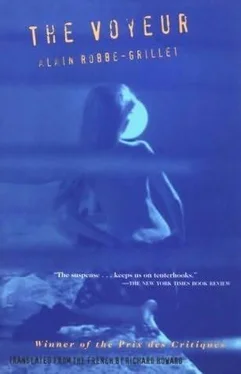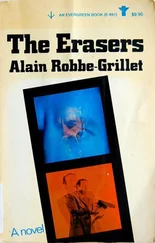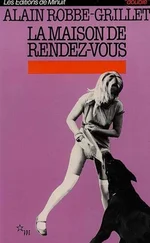“I don’t know…. Jackie made fun of him.”
“That’s no reason.”
The girl shrugged lier shoulders.
“He didn’t kill her,” Mathias continued. “No one killed her. She fell all by herself. She slipped when she was too near the edge.” “Jackie didn’t slip,” the girl said.
“Look at this place—here. The ground caves in every minute. All you have to do is come a little too close….”
He pointed to the edge of the cliff quite near by, but she did not even turn her eyes in that direction.
“You want to cover up,” she said. “Don’t worry, I won’t say anything either.”
“What proof would you have?”
“You heard what he was yelling yesterday, at dinner: that she wouldn’t come any more now!… What did that mean?… He pushed her to get revenge. You know perfectly well he did. He was prowling around here when it happened.”
Mathias thought for a few moments before answering: “You don’t know what time it happened.”
“But Maria was looking for her after twelve-thirty…”
“There was the whole morning before that.”
The girl hesitated, then lowered her voice and said, almost in a whisper: “Jackie was still here after eleven.”
Mathias recalled the succession of his own movements; what she was saying was quite exact. He found it irritating that this detail should be known. He asked: “How do you know?”
But her answer told him nothing he had not already guessed: the girl had paid a secret visit to her young friend out here on the cliff. She had not left her before eleven-thirty. The accident could therefore be situated within about thirty minutes of its occurrence. If his customers had noted the salesman’s course with the same accuracy…
“Even so,” he said, “that leaves a whole hour in between…. Plenty of time to lose your balance.”
“And that was just when he was prowling around the cliff, running after me, the way he does whenever I set foot outside the house!”
“Yes… certainly… it is strange, all right. Tell me again what he said at dinner. ‘She won’t come back any more…’”
“‘…now.’ ‘She won’t come back any more now!’”
“Yes, that’s it—I heard it too!”
“Then you see!”
“Perhaps you’re right after all,” said Mathias.
They stood without moving, neither of them speaking. Then he thought she was going to leave; but after taking two steps, she came back toward him, holding something she had been concealing in the palm of her hand.
“And then I found this, too.”
It was one of the cigarettes. She pointed toward the bottom of the hollow: “I found it here, just now. People don’t usually throw away half-smoked cigarettes. He had it in his mouth, the way he does in the morning, and he dropped it because Jackie was struggling.”
Mathias held out his hand and took the object—to look at it more closely, supposedly. With a sudden gesture he made it disappear into his duffle coat pocket. The girl watched him with astonished eyes, her hand still stretched out to take it back. But he merely declared: “This is the actual proof that you are right.”
“I wasn’t going to say anything, you didn’t need to take it away from me.… I wanted to throw it into the water…”
She stepped back.
Mathias forgot to answer. He saw her retreating, still staring at him, her eyes wide. Then suddenly she turned around and began to run toward the lighthouse.
When she had disappeared behind a hillock, he returned down the path by which he had come. The first thing that caught his attention—in the grass, at the bottom of the hollow sheltered from the wind—was a second half-smoked cigarette exactly like the first. He had not noticed it just now, when he had come. A tuft of grass slightly longer than the rest concealed it from view except at the very point where he happened to be standing.
Having picked it up and put it in his pocket, he began looking for the third as well, thoroughly examining the few square yards of ground where it might have fallen. But his only approximate recollection of such places prevented him from establishing the area’s perimeter with much certitude.
Despite his efforts, he could not manage to discover the third cigarette. He decided it must be smaller than the other two; hence it would be less compromising—especially by itself—since it was virtually the size of the cigarette butts any smoker might throw away. No one could reasonably imagine what it had been used for.
Mathias concluded that even if this third cigarette was as little smoked as the preceding two, it could still pass for the one Jean Robin—or rather the man whose name was not Jean Robin—might have lost while he was dragging the little shepherdess toward the edge of the cliff by force. The main thing, after all, was that an eventual investigator would be unable to find more than one; for if nobody knew what they had been used for, it would be ridiculous to suspect the salesman—perhaps the only person on the whole island who had never harbored any resentment toward the girl.
On the other hand, the presence of several half-smoked cigarettes would certainly seem strange—might even suggest motives other than the vengeance of a rejected lover, if it was ever discovered, at the same time, that the wounds on the body were more suspect than those left by a fall against the rocks, the action of the sea, the ravages of fish or crabs.
Mathias would have only to destroy the two butts in his possession and claim to have thrown away the one the girl had just given him.
To gain time—all these ideas and investigations had delayed him considerably—Mathias decided to take a path back to town that would avoid the lighthouse crossroads. There were plenty to choose from among the complicated network crossing the moor. But the rolling ground prevented him from calculating his steps according to the goal to be reached—invisible from where he was—so that he had to orient himself by guesswork, deciding on an angle of approximately thirty degrees with his original direction.
He decided to follow a path that was well marked. Aside from the inconvenience of cross-country walking, it was quite likely that if he kept to such a path he might find the very short cut Maria Leduc had taken to the cliff.
Unfortunately none of the numerous existing paths coincided with the theoretical direction Mathias had selected; he was therefore confined, from the start, to one of two possible detours. Besides, every path looked winding and discontinuous—separating, reuniting, constantly interlacing, even stopping short in a briar patch. All of which obliged him to make many false starts, hesitations, retreats, posed new problems at every step, forbade any assurance as to the general direction of the path he had chosen.
Furthermore, Mathias often chose without giving much thought to the possible alternatives. Since he was walking fast, he did not have much time to think in any case. Something more serious was bothering him, something about his reasoning in the case of those three cigarettes: the one still on the cliff was not the one the young woman had picked up. Yet she was relying on its abnormal length to prove the crime. If a butt less than an inch long should now come to light, how could the salesman manage—in the eventuality of a confrontation—to make her admit it was the one she had given him? To explain the fact that it had grown shorter, it would be necessary for Mathias to have lighted it again and smoked it himself before throwing it away—an alibi which lacked both simplicity and likelihood.
His deductions and hypotheses were interrupted by his surprise at suddenly finding himself on the main road again, just opposite the road to the Marek farm—that is, not far from the milestone.
Читать дальше












